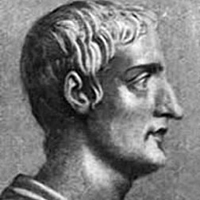The Widow of Ephesus by Petronius: Analysis
The Widow of Ephesus deals with the fidelity of women. The narrator Eumolpus wants to prove that all women are unfaithful and can be seduced sooner or later. To prove this fact, Eumolpus presents the story of the widow from the city of Ephesus.

Gaius Petronius Arbiter
The lady is known as very faithful women. She loves and respects her husband. Her love is so great that she follows her husband’s dead body to the vault in the cemetery.
The story proves the infidelity of women by giving the story a very sharp ironical twist when the lady submits herself to the request of the soldier to eat food. This happens only after one day of her husband’s death, whereas she had earlier promised that she would not be engaged to any man after the death of her husband. The lady eats the food provided by the soldier. Her passions are aroused. The Soldier and the Widow marry very soon. They passed the night together.
The above episode is enough to prove the infidelity of the Widow towards her husband. But the theme of unfaithfulness is further increased by one fact. It happens that one of the thieves body was taken away from the cross. The soldier was to be punished for the theft with the death penalty, as it was his duty to protect the dead bodies from stealing. The story gets a very ironical meaning when the Widow offers her husband’s dead body to be put in place on the thief’s dead body to protect her illegal lover. This is enough to prove the infidelity of woman in general. How ironical it is that the lady famous for her fidelity, marries a second man only a couple of days after her husband’s death. It is more ironical that she offers her husband’s dead body to be a substitute for the missing dead body of the thief. The entire theme of the unfaithfulness of the women is very much focused by the Widow’s love and her hasty marriage with the soldier which at last results in the substitution of the dead body at the cross of her husband’s dead body.
Related Topics
Summary of The Widow of Ephesus
Biography of Gaius Petronius Arbiter
 |
bachelorandmaster.com |